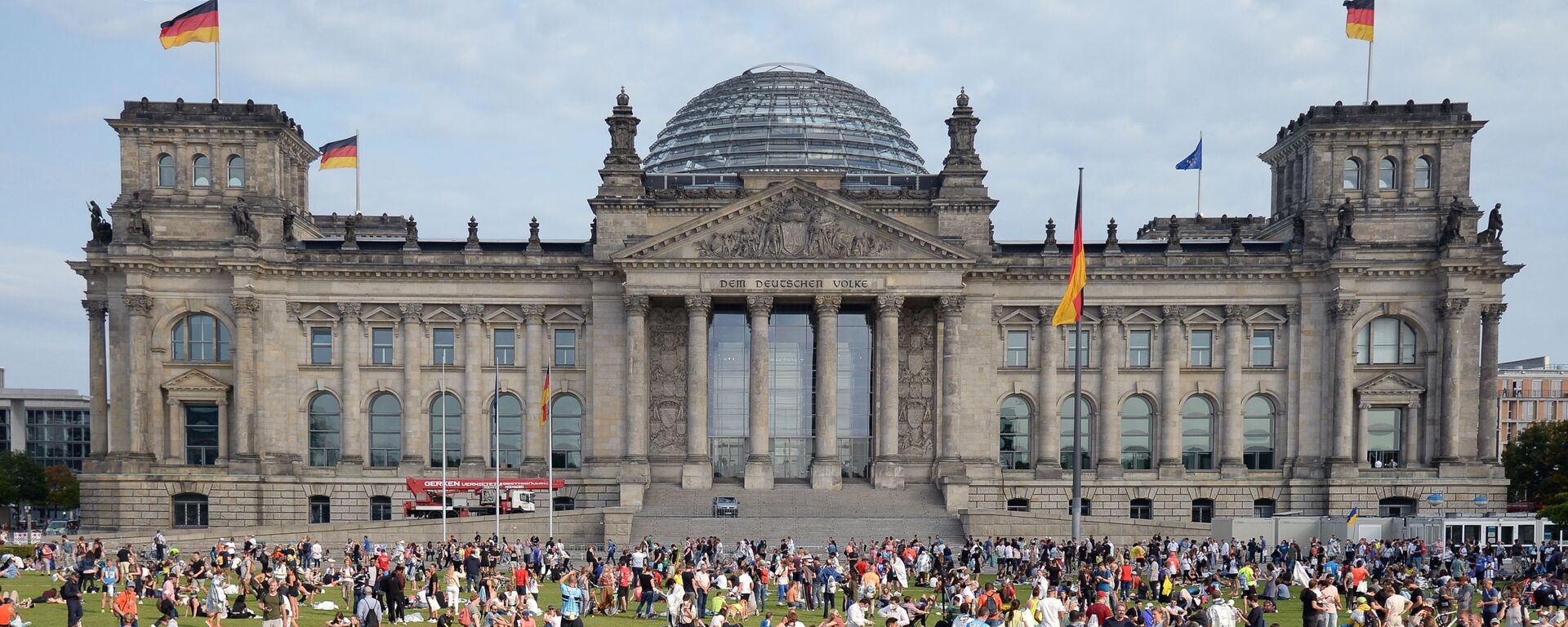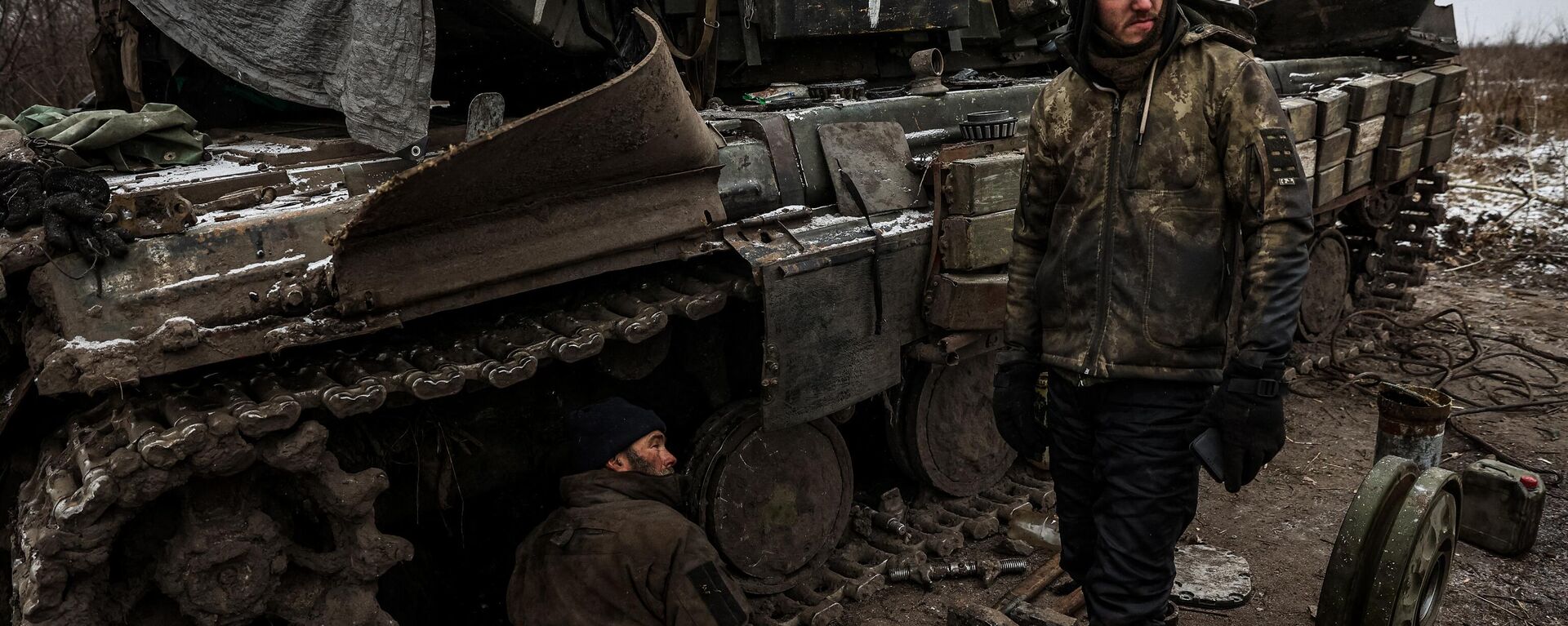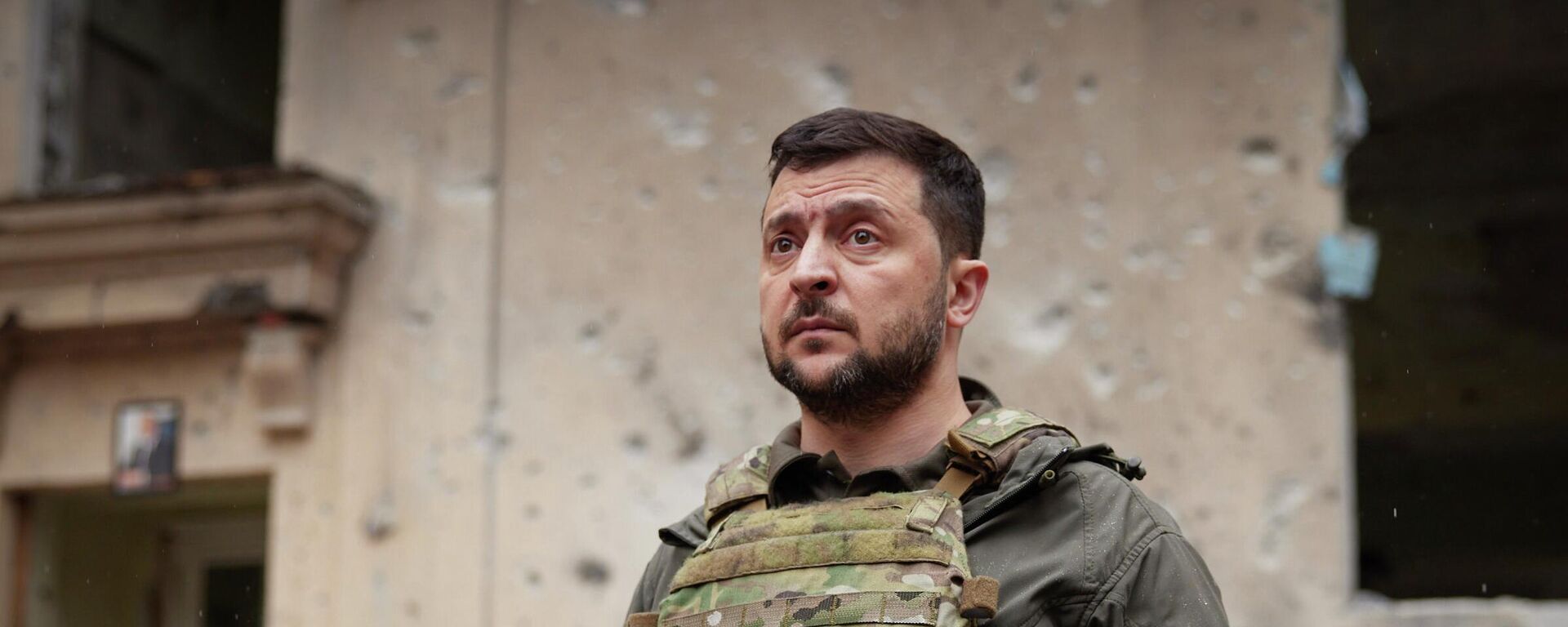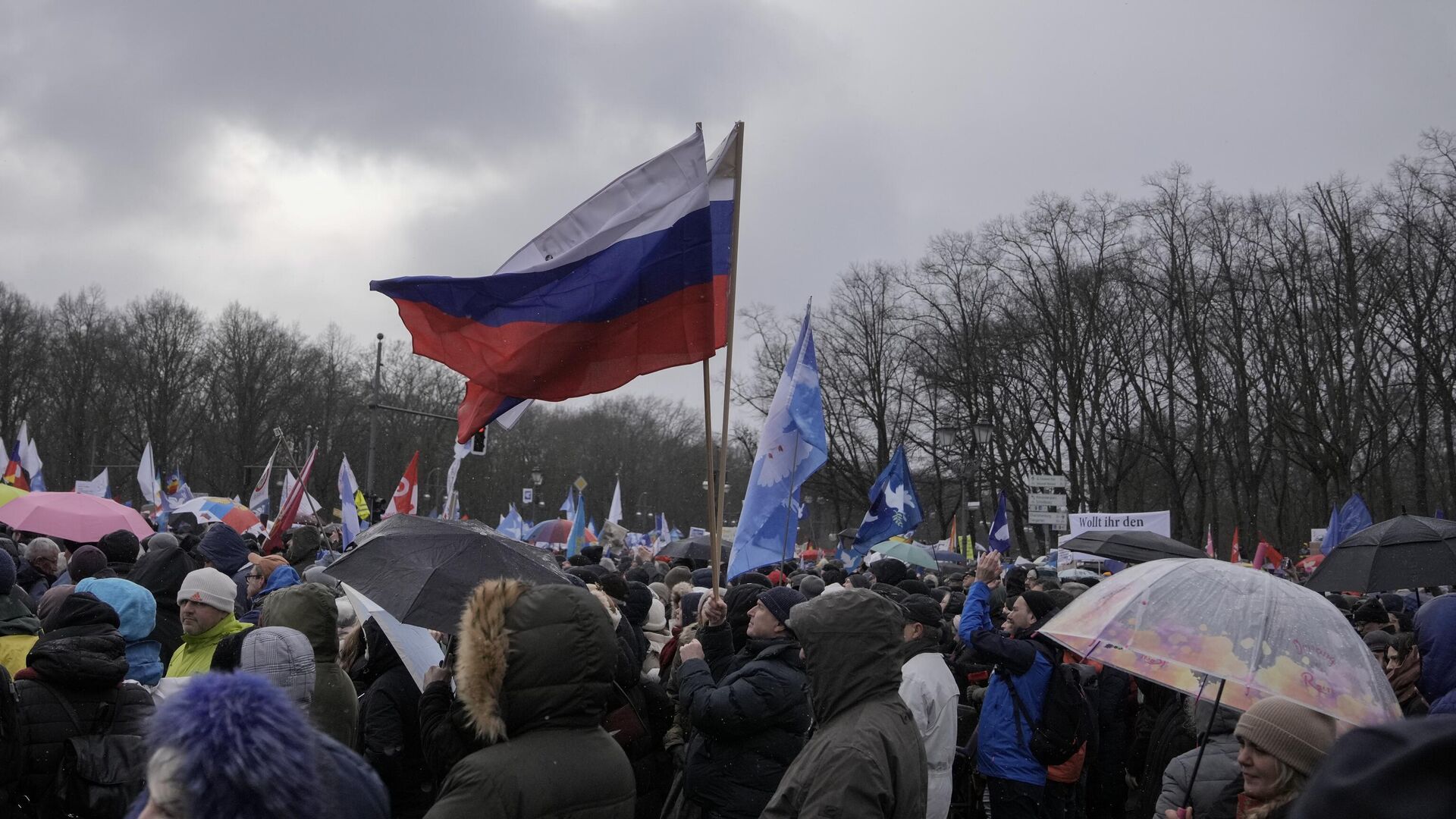https://sputnikglobe.com/20230227/diplomacy-instead-of-arming-ukraine-how-peace-movement-is-scaling-up-in-europe-1107850285.html
Diplomacy Instead of Arming Ukraine: How Peace Movement is Scaling Up in Europe
Diplomacy Instead of Arming Ukraine: How Peace Movement is Scaling Up in Europe
Sputnik International
A wave of anti-war protests has swept through Europe last weekend. Thousands of demonstrators in Germany, France and Italy rallied against arms supplies to Ukraine, warning that the NATO-fanned military escalation is fraught with the risk of sparking World War III.
2023-02-27T17:44+0000
2023-02-27T17:44+0000
2023-02-27T17:44+0000
analysis
europe
opinion
russia
ukraine
germany
nord stream
seymour hersh
peace
protests
https://cdn1.img.sputnikglobe.com/img/07e7/02/19/1107806854_0:0:3073:1728_1920x0_80_0_0_d8e7dbb4d44c15b49cad471312559bb1.jpg
"Sentiments in European societies about the conflict in Ukraine should be measured in terms of penetration of cognitive warfare," Paolo Raffone, a strategic analyst and director of the CIPI Foundation in Brussels, told Sputnik. "The powerful US machine has compacted two-thirds of the sentiment on the idea that the war will end only with a Ukrainian victory."Despite most of the EU establishment publicly advocating continuous military support to Kiev, Europeans are increasingly concerned that the conflict could spill over to the Old Continent and express dissatisfaction with anti-Russia sanctions which backfired across the bloc.Thus, Italian demonstrators, who took to the streets in Rome, Genoa, Pisa, Milan, Florence and Lecce last Saturday believe that Rome’s pro-EU policy and confrontation with Russia have led to detrimental economic consequences for the Italian population. Meanwhile, French protesters marched through Paris on Sunday carrying banners that read: "For Peace," "No to a Third World War" and "Let’s Quit NATO.""The biggest European common concern is the expansion of the conflict and the escalation to a nuclear level," Raffone said. "The second concern is the economic consequence of the induced support to Ukraine (in terms of prolonged costs). The third concern is the energy crisis that is still looming on economic activities and households."German Peace MovementSome experts suggest that Germany is the country that is poised to lose the most from the ongoing confrontation between the West and Russia. The Western European state has imported Russia's cheap gas since the 1970s. Now, Germany's status as a European industrial powerhouse is shattered given the unfolding de-industrialization in the state driven by high energy costs. The destruction of the Nord Stream gas pipelines in September came as the last straw for German industries, some of which announced their decision to relocate in October 2022.Therefore, unsurprisingly, the Nord Stream sabotage bombshell dropped by Pulitzer Prize-winning journalist Seymour Hersh earlier this month prompted a heated debate in the Bundestag with the left-wing Die Linke and the right-wing Alternative für Deutschland (AfD) calling on the German government to probe the allegations. According to Hersh, it was US and Norwegian operatives who blasted Nord Stream. If that's the case, "one would have to question whether the [NATO] alliance guarantees security in Europe or rather endangers it," stated AfD Co-Chairman Tino Chrupalla following the bombshell publication."Economic worries about the suicidal sanctions are mounting. Many are afraid that the welfare state will not be able to bear the additional burdens caused by the large number of Ukrainians. Added to this is the growing concern that the transatlantic German government is leading us more and more into active warfare. The majority of Germans are not willing to send their children to a foreign war for US interests. They understand that this war has nothing to do with 'defending our democracy'," Blex continued.Last Saturday, Die Linke helped organize a "Peace Rally" in Berlin which brought together an estimated 50,000 people. Protesters were seen waving peace flags and holding up placards that read, "Make Peace Without Weapons" and "Diplomacy Instead of Arms Deliveries."He revealed that on Sunday there was a big demonstration in Ramstein under the motto "Ami go home". According to him, there were approximately 3,000 participants, including Dr. Christina Baum, member of the German Bundestag and of the federal executive board of the AfD.Furthermore, on February 24, there was a large demonstration in Dresden with Björn Höcke and Dr. Christopher Barth, according to Blex. Both are parliamentary group leaders of the AfD in the state parliaments of Thuringia and Brandenburg. "The motto was 'Make peace without weapons'. In German it rhymes," he added.Divisions Brewing Within EUEven though the EU shows "unity" when it comes to arming and funding Ukraine, there are important differences within the bloc, according to Fernand Kartheiser, president of the Alternative Democratic Reform Party parliamentary group in the Luxembourg Parliament.As per the lawmaker, the peace movement in Europe is still weak. However, its significance is growing, he added."The important factors are that the criticism comes from many different directions: left and right wing parties, churches, academics, military and economic experts. Overall, one can safely assume that the peace movements will become stronger and develop a real political weight," Kartheiser explained.Europe's unwillingness to cross swords with the Biden administration, which is fanning the Russo-Ukrainian conflict by pouring more and more weapons into the zone, may cost the Old Continent its "strategic autonomy," the lawmaker warned."In those countries, where a more pronounced and more independent European identity and role are political considerations of some significance, such as in France, the president is under pressure to look for a more visible French role in the conflict and for a more tangible differentiation from Washington. In other countries, it is interesting to note that the Green parties, that were traditionally pacifistic, have now turned into quite aggressive political forces," Kartheiser observed.At the same time, Sputnik's interlocutors have admitted that Europe is not ready for a years-long conflict in Ukraine or to put its production on a war footing."The EU countries, which are still spoiled by prosperity, are not in a position to do this," Blex believes. For his part, Raffone noted that while the population would certainly like to avoid this perspective, "the political leaders are blindly slipping into it."In addition, "people will also follow the debates in the United States, where the Republican Party is much more reluctant to portray Russia as a foe than the Democrats," the lawmaker pointed out."Political wisdom, therefore, will hopefully prevail and lead to a reduction of tensions," he concluded.
https://sputnikglobe.com/20230226/frenemy-how-us-deprives-germany-of-strategic-autonomy-and-status-as-industrial-powerhouse--1107807263.html
https://sputnikglobe.com/20230128/truth-about-tanks-how-nato-lied-its-way-to-disaster-in-ukraine-1106786081.html
https://sputnikglobe.com/20221111/we-have-had-enough-why-western-leaders-populations-call-for-halting-money-flow-to-ukraine-1104025789.html
https://sputnikglobe.com/20230220/protesters-descend-on-washington-demand-natos-dissolution-peace-negotiations-with-russia-1107600002.html
russia
ukraine
germany
Sputnik International
feedback@sputniknews.com
+74956456601
MIA „Rossiya Segodnya“
2023
News
en_EN
Sputnik International
feedback@sputniknews.com
+74956456601
MIA „Rossiya Segodnya“
Sputnik International
feedback@sputniknews.com
+74956456601
MIA „Rossiya Segodnya“
peace protests in europe, italian protesters, eu protesters oppose arming ukraine, threat of ww3, eu protesters call for diplomacy, opposition to arms deliveries to ukraine, afd and die linke organized protests, peace moevement in europe
peace protests in europe, italian protesters, eu protesters oppose arming ukraine, threat of ww3, eu protesters call for diplomacy, opposition to arms deliveries to ukraine, afd and die linke organized protests, peace moevement in europe
Diplomacy Instead of Arming Ukraine: How Peace Movement is Scaling Up in Europe
A wave of anti-war protests has swept through Europe last weekend. Thousands of demonstrators in Germany, France and Italy rallied against arms supplies to Ukraine, warning that the NATO-fanned military escalation is fraught with the risk of sparking World War III.
"Sentiments in European societies about the conflict in Ukraine should be measured in terms of penetration of cognitive warfare," Paolo Raffone, a strategic analyst and director of the CIPI Foundation in Brussels, told Sputnik. "The powerful US machine has compacted two-thirds of the sentiment on the idea that the war will end only with a Ukrainian victory."
"This has been possible with the co-opted engagement of the EU leaders, first of all [EC President] Ursula von der Leyen, and NATO, who are acting like the madrasa in a caravanserai. The consequence is also a wide anti-Russian sentiment powerfully sustained by the UK, Poland and Ukrainian leaders and media. I stress that it is not even an autonomous perception of the Europeans but a sheer manipulation of their cognitive capacities," Raffone continued.
Despite most of the EU establishment publicly advocating continuous military support to Kiev, Europeans are increasingly concerned that the conflict could spill over to the Old Continent and express dissatisfaction with anti-Russia sanctions which backfired across the bloc.
Thus, Italian demonstrators, who took to the streets in Rome, Genoa, Pisa, Milan, Florence and Lecce last Saturday
believe that Rome’s pro-EU policy and confrontation with Russia have led to detrimental economic consequences for the Italian population. Meanwhile,
French protesters marched through Paris on Sunday carrying banners that read:
"For Peace," "No to a Third World War" and "Let’s Quit NATO.""The biggest European common concern is the expansion of the conflict and the escalation to a nuclear level," Raffone said. "The second concern is the economic consequence of the induced support to Ukraine (in terms of prolonged costs). The third concern is the energy crisis that is still looming on economic activities and households."

26 February 2023, 04:15 GMT
Some experts suggest that Germany is the country that is poised to lose the most from the ongoing confrontation between the West and Russia.
The Western European state has imported Russia's cheap gas since the 1970s. Now, Germany's status as a European industrial powerhouse is shattered given the unfolding de-industrialization in the state driven by high energy costs. The destruction of the Nord Stream gas pipelines in September came as the last straw for German industries, some of which announced their decision to relocate in October 2022.
Therefore, unsurprisingly, the Nord Stream sabotage bombshell dropped by Pulitzer Prize-winning journalist Seymour Hersh earlier this month prompted a heated debate in the Bundestag with the left-wing Die Linke and the right-wing Alternative für Deutschland (AfD)
calling on the German government to probe the allegations. According to Hersh, it was US and Norwegian operatives who blasted Nord Stream. If that's the case, "one would have to question whether the [NATO] alliance guarantees security in Europe or rather endangers it," stated AfD Co-Chairman Tino Chrupalla following the bombshell publication.
"The German government is still stuck firmly in their shameful vassal war rhetoric," Dr. Christian Blex, an AfD lawmaker of the state parliament of North Rhine-Westphalia, told Sputnik. "The perseverance and final victory slogans do not allow any change of course. To do this, however, the government would first have to free itself from its sycophantic allegiance to the US. That is of course unimaginable with this green-woke transatlantic government."

28 January 2023, 12:00 GMT
"Economic worries about the suicidal sanctions are mounting. Many are afraid that the welfare state will not be able to bear the additional burdens caused by the large number of Ukrainians. Added to this is the growing concern that the transatlantic German government is leading us more and more into active warfare. The majority of Germans are not willing to send their children to a foreign war for US interests. They understand that this war has nothing to do with 'defending our democracy'," Blex continued.
Last Saturday, Die Linke helped organize a "Peace Rally" in Berlin which brought together an estimated 50,000 people. Protesters were seen waving peace flags and holding up placards that read, "Make Peace Without Weapons" and "Diplomacy Instead of Arms Deliveries."
"I am very pleased that, despite all the defamation, tens of thousands of people have taken part in the demonstrations over the past few days, including high-ranking politicians from my party," said Blex. "In the other European countries, too, it is becoming clear that fewer and fewer citizens are following the transatlantic pseudo-elite."
He revealed that on Sunday there was a big demonstration in Ramstein under the motto "Ami go home". According to him, there were approximately 3,000 participants, including Dr. Christina Baum, member of the German Bundestag and of the federal executive board of the AfD.
Furthermore, on February 24, there was a large demonstration in Dresden with Björn Höcke and Dr. Christopher Barth, according to Blex. Both are parliamentary group leaders of the AfD in the state parliaments of Thuringia and Brandenburg. "The motto was 'Make peace without weapons'. In German it rhymes," he added.

11 November 2022, 14:25 GMT
Divisions Brewing Within EU
Even though the EU shows "unity" when it comes to arming and funding Ukraine, there are important differences within the bloc, according to Fernand Kartheiser, president of the Alternative Democratic Reform Party parliamentary group in the Luxembourg Parliament.
"Hungary, Croatia and others have dissenting views, even if they don't dare to oppose themselves openly to the larger member states," Kartheiser told Sputnik. "But also in France and Germany, there are many political pressures for a change of policy. In my opinion, sanctions will cause big problems for the EU in the foreseeable future. Under the pressure of their economies, some countries might advocate an easing or even a lifting of some of the sanctions and other member states, for political reasons, will oppose such a change. As we all know, it is easy to introduce sanctions but immensely difficult to lift them."
As per the lawmaker, the peace movement in Europe is still weak. However, its significance is growing, he added.
"The important factors are that the criticism comes from many different directions: left and right wing parties, churches, academics, military and economic experts. Overall, one can safely assume that the peace movements will become stronger and develop a real political weight," Kartheiser explained.

20 February 2023, 02:15 GMT
Europe's unwillingness to cross swords with the Biden administration, which is fanning the Russo-Ukrainian conflict by pouring more and more weapons into the zone, may cost the Old Continent its "strategic autonomy," the lawmaker warned.
"In those countries, where a more pronounced and more independent European identity and role are political considerations of some significance, such as in France, the president is under pressure to look for a more visible French role in the conflict and for a more tangible differentiation from Washington. In other countries, it is interesting to note that the Green parties, that were traditionally pacifistic, have now turned into quite aggressive political forces," Kartheiser observed.
At the same time, Sputnik's interlocutors have admitted that Europe is not ready for a years-long conflict in Ukraine or to put its production on a war footing.
"The EU countries, which are still spoiled by prosperity, are not in a position to do this," Blex believes. For his part, Raffone noted that while the population would certainly like to avoid this perspective, "the political leaders are blindly slipping into it."
The emphasis on a wartime economy means of course a reduction of budgets for civilian and social purposes. The 'Russian threat' is not perceived to be strong enough to justify such a dramatic change of policy. The propaganda efforts aim therefore at demonizing Russia. But, it is doubtful that trade unions, churches, and many others will accept major social sacrifices because of a very theoretical and not really credible threat.
Fernand Kartheiser
President of the Alternative Democratic Reform Party parliamentary group in the Luxembourg Parliament.
In addition, "people will also follow the debates in the United States, where the Republican Party is much
more reluctant to portray Russia as a foe than the Democrats," the lawmaker pointed out.
"Political wisdom, therefore, will hopefully prevail and lead to a reduction of tensions," he concluded.






